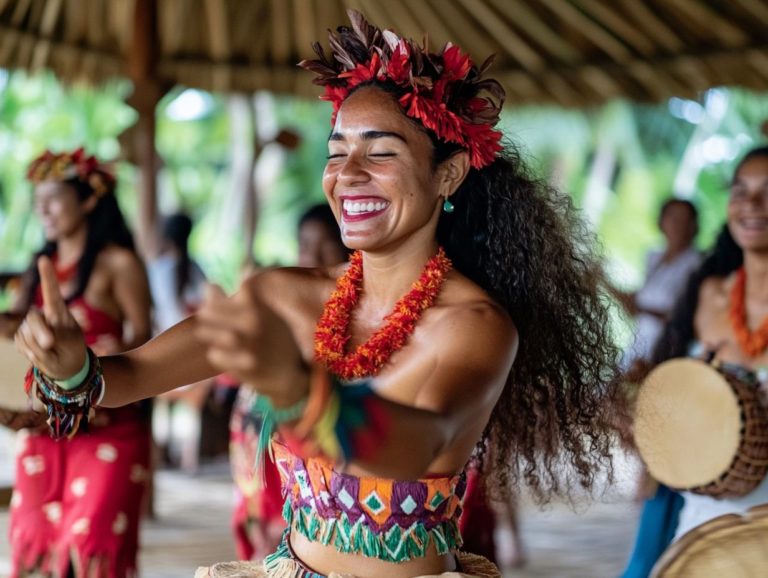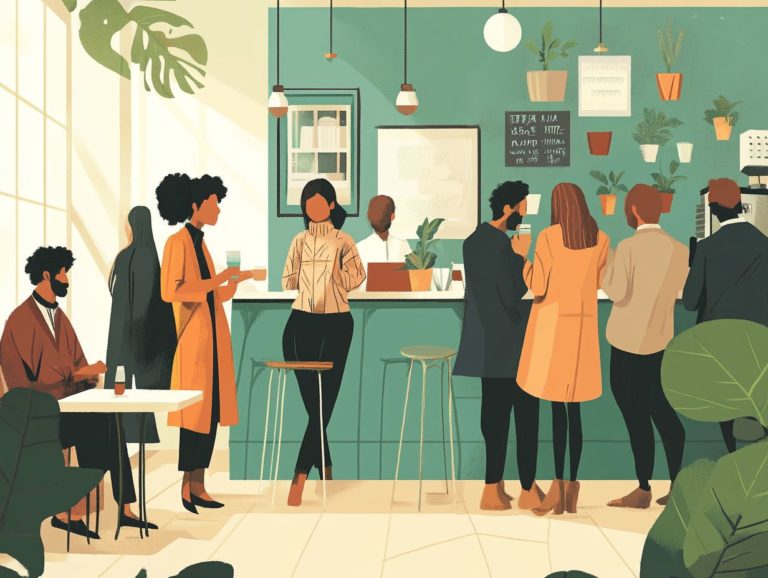How to Overcome Stereotypes While Studying Abroad
Studying abroad can be an enriching experience, yet it often carries with it a set of stereotypes that influence perceptions and interactions. Knowing how these stereotypes form and affect you is crucial for making the most of your journey.
This article delves into the common stereotypes you may encounter during your study abroad experience, the challenges they pose, and practical strategies for overcoming them.
By cultivating a supportive and inclusive environment, you can enhance your personal growth and cultural understanding, ensuring you make the most of your time abroad.
Dive in to discover how to navigate these complexities and elevate your study abroad experience to new heights.
Contents
- Key Takeaways:
- Understanding Stereotypes in Study Abroad
- Common Stereotypes in Study Abroad
- Challenges and Consequences of Stereotypes
- Strategies for Overcoming Stereotypes
- Creating a Supportive Environment
- Benefits of Overcoming Stereotypes in Study Abroad
- Personal Growth and Cultural Understanding
- Frequently Asked Questions
- What are stereotypes and why do they matter while studying abroad?
- How can I prevent myself from reinforcing stereotypes while studying abroad?
- What are some ways to combat stereotypes while studying abroad?
- How should I respond if I encounter a stereotype while studying abroad?
- What should I do if I experience discrimination based on stereotypes while studying abroad?
- How can I use my study abroad experience to break stereotypes?
Key Takeaways:
- Be aware of stereotypes and their impact during study abroad.
- Challenge stereotypes by building a diverse and inclusive community.
- Overcoming stereotypes leads to personal growth and a deeper understanding of different cultures.
Understanding Stereotypes in Study Abroad
Understanding stereotypes (oversimplified beliefs about a group) in the context of studying abroad is essential for enriching your understanding of different cultures and fostering personal growth among international students. These stereotypes can profoundly shape your emotional responses to cultural differences, ultimately influencing your overall experience in a new environment.
By confronting and addressing these preconceived notions, you can better navigate cultural challenges, deepen your cultural immersion, and cultivate a more inclusive atmosphere that truly appreciates cultural diversity.
Definition and Impact of Stereotypes
Stereotypes are generalized beliefs or assumptions about specific groups that can seriously undermine cultural understanding, particularly when you’re facing culture shock (the feelings of confusion and uncertainty when in an unfamiliar environment) during study abroad programs.
These preconceived notions often lead to misunderstandings and miscommunications, making it difficult for you as an international student to navigate social interactions in a new environment. You might find yourself struggling to fit in, grappling with feelings of isolation or frustration when your identity is reduced to a stereotype. This experience not only impacts your self-esteem but also makes it harder for you to forge meaningful connections with peers.
The emotional turmoil stemming from these misconceptions can hinder your academic performance, complicating an already challenging adjustment process. Recognizing the roots and implications of stereotypes is essential for cultivating empathy and enhancing interpersonal relationships across cultures.
Common Stereotypes in Study Abroad
Common stereotypes that international students face while studying abroad frequently arise from cultural differences. These differences can significantly shape their emotional responses and communication styles with those around them.
Examples and Prevalence
Examples of common stereotypes in study abroad often include assumptions about language skills, cultural norms, and lifestyle choices, which can lead to unexpected culture shock for international students.
For instance, many might presume that all international students struggle with English, which unfairly underestimates the proficiency of those who are already fluent or have diligently taken language courses. Similarly, misconceptions about cultural practices abound; it’s easy to assume that students from certain countries strictly adhere to traditional customs, overlooking the modern influences that shape their lives.
Stereotypes can make you feel isolated and frustrated as you navigate your new environments while facing these unflattering generalizations. By highlighting cultural similarities such as shared interests in music, food, or hobbies you can create powerful reminders of the common ground that exists.
This approach fosters connections that transcend borders and helps dispel unfounded assumptions, paving the way for a richer, more inclusive experience.
Challenges and Consequences of Stereotypes
The challenges and repercussions of stereotypes in study abroad contexts can profoundly hinder your cultural adjustment and emotional well-being as an international student.
Ready to challenge these stereotypes? Let’s explore how!
Effects on Personal and Social Experience
The effects of stereotypes on personal and social experiences can significantly shape your journey as an international student. These preconceived notions often create invisible barriers that hinder meaningful connections and breed misunderstandings between diverse cultures.
When you allow limited viewpoints to dictate how you see each other, it restricts your chances for genuine engagement and perpetuates biases that can obstruct social integration. By confronting these stereotypes and embracing diversity, you have the chance to rise above initial discomfort, discovering unique pathways for personal growth.
This journey may involve learning to understand others better, building resilience, and forming friendships that enrich your worldview. Ultimately, you can transform challenges into opportunities for growth and develop a deeper appreciation for different cultures.
Strategies for Overcoming Stereotypes
Addressing misconceptions directly enriches students’ experiences abroad and helps them navigate culture shock with confidence. By tackling these issues, students can cultivate deeper connections with diverse cultures.
Practical Tips for Dealing with Stereotypes
To navigate stereotypes, immerse yourself in the local culture and embrace varied communication styles. This can help maintain emotional balance during your study abroad experience.
By adopting local customs and traditions, you can break down barriers and forge meaningful connections with your peers. Building trusted friendships often starts with finding common interests, whether that means joining clubs or participating in community events.
It s essential to express yourself confidently while remaining open to learning from others; this kind of two-way dialogue is key to dispelling misconceptions. Practicing patience and empathy in conversations can significantly reduce misunderstandings, enhancing your entire study abroad journey.
Creating a Supportive Environment
Fostering a supportive environment for international students is crucial for promoting cultural diversity and enriching cross-cultural understanding within study abroad programs.
By prioritizing inclusivity, you enhance the experience for these students and cultivate a vibrant community that benefits everyone involved.
Building a Diverse and Inclusive Community
Creating a diverse and inclusive community is essential for enhancing the experiences of international students and fostering empathy among all participants.
By implementing support initiatives, institutions can foster an environment where every individual feels valued and heard. This journey begins with establishing mentorship programs that connect domestic and international students, encouraging shared experiences and meaningful dialogue.
Hosting workshops that showcase cultural diversity can deepen understanding among students from various backgrounds. Engaging in collaborative activities and celebrating a variety of cultural events strengthens community ties, ensuring everyone has a voice and that their unique perspectives enrich the learning experience.
Nurturing a supportive environment allows all students to thrive both academically and socially, creating a vibrant tapestry of experiences that benefits everyone involved.
Benefits of Overcoming Stereotypes in Study Abroad
By overcoming stereotypes in study abroad programs, you unlock numerous benefits that can enhance your personal growth, deepen your cultural understanding, and enrich your overall experience as an international student.
Embracing diverse perspectives broadens your horizons and transforms your journey into a meaningful and rewarding adventure!
Personal Growth and Cultural Understanding
Personal growth and cultural understanding emerge as profound outcomes when you overcome stereotypes during your study abroad experience, leading to a richer appreciation for diversity and the ability to bounce back from challenges.
As you navigate the intricacies of a new cultural landscape, you ll often find yourself facing prejudiced ideas not just about others, but also about your own identity. This journey fosters empathy, allowing you to look beyond superficial differences and recognize the vibrant tapestry of human experiences.
Transformative interactions help build meaningful relationships, helping you cultivate understanding feelings and adaptability. By embracing unfamiliar customs and perspectives, you supercharge your education, expanding your understanding and igniting a transformative dialogue that reverberates well beyond your time abroad.
Frequently Asked Questions
What are stereotypes and why do they matter while studying abroad?
Stereotypes are oversimplified and often unfair beliefs or assumptions about a certain group of people. They matter while studying abroad because they can lead to misunderstandings, discrimination, and hinder your overall experience.
How can I prevent myself from reinforcing stereotypes while studying abroad?
Start by acknowledging your own biases and be open to challenging them. Engage in conversations with locals and try to understand their perspectives. Educate yourself about the culture and people of the country you are studying in.
What are some ways to combat stereotypes while studying abroad?
Travel to different regions within the country to get a broader understanding of its diversity. Participate in cultural events and activities. Take the time to learn the language and communicate with locals. Surround yourself with a diverse group of friends.
How should I respond if I encounter a stereotype while studying abroad?
Stay calm and try to educate the person about the harmful effects of stereotypes. Share your own experiences and correct any misinformation. Remember to be respectful and understanding, as change takes time.
What should I do if I experience discrimination based on stereotypes while studying abroad?
First, know that it is not your fault and you are not alone. Reach out to local resources, such as your study abroad program or the international student office, for support. Document the incident and speak up about it to raise awareness.
How can I use my study abroad experience to break stereotypes?
Share your experiences and stories with others back home. Use social media to showcase the diversity and beauty of the country you studied in. Get involved in community service projects and initiatives that promote cultural understanding.
Ready to transform your study abroad experience? Embrace the adventure!






